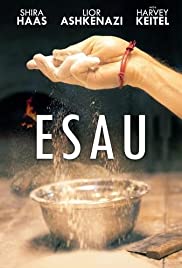
ESAU
Russia/Israel, 2019, 113 minutes, Colour.
Lior Ashkenazi, Mark Ivanir, Harvey Keitel, Shira Haas, Yuliya Peresild.
Directed by Pavel LungiIn.
Esau is a complex drama, with a Russian director and finance, with some Russian Orthodox elements in the background. But, it is also an Israeli film with strong Jewish themes. (The director is noted for such films as
With the title, it is clear that this film has a biblical background, the story of the rivalry between the two brothers, Esau and Jacob, though in this narrative Isaac is not the father but, rather, Abraham. While Esau is the firstborn, there are complications with his brother in the courting of a young woman in the town, Esau giving up his birthright and travelling to the United States and making a name there is an author.
He returns to Israel, further complications with his brother and, especially with his father, a renowned baker who has handed on his inheritance to his younger son. However, there are complications in the marriage, deaths, a son killed in war, withdrawal and mental illness.
Esau is played by the celebrated Israeli actor, Lior Ashkenazi. There are also international actors including Mark Ivanir and American, Harvey Keitel. Shira Haas who made an impression in Unorthodox is also featured.
Part of the complexity of the plot comes from the beginning, a group of Russian Orthodox moving through the desert, encountering the Israelis, marriages – but the Russian influence in the family always considered alien, especially ethnically and religiously.
- The title? Biblical background? Abraham and Sarah? The omission of Isaac and Rebecca? The twins, Esau and Jacob, the firstborn issue, Esau giving up his birthright? The rivalry between the brothers, the consequences?
- The opening, the Russian story, the Orthodox Christians, their bell, the horses collapsing, the men pulling the large bell, the village following, in Israel, in Jerusalem, the setting up of the bell, the Orthodox clergy and congregation, the blessing of the bell, the tolling of the bell?
- The leader, leaving Israel, his psychological physical condition, his legs, treatment by the rabbi, his becoming Jewish, the name Michael? His family, Sarah his daughter?
- The mythmaking with this kind of story and its consequences? The taking up with the myth at the end? Abraham, the Jewish soldier deserting the Turkish army? Wandering the desert, the goose, encountering Sarah, their marriage? And the consequences? Starting happily? Disasters?
- Esau in the United States, his publications, signing, popularity? His home? Living alone? The phone call in the night? Thinking it was Leah?
- Esau going to Israel, telling the taxi driver it was the first time? Going to his home, to the bakery, Jacob’s reaction, hostile, the embrace? His settling in? His niece and the photographs? The mystery about Leah, confined to her room, after the death of her son? Her husband caring for her, showering and washing her? But Esau not allowed in?
- The impact of the colour grading for the scenes in Israel, black and white, the touches of colour?
- Esau, typing his story, his voice-over, the flashbacks?
- The gradual building up of the story through the flashbacks, the twins and their mother, the birth, the dispute about who is the older, Jacob’s decision that it was Esau? The boys growing up, bonding, working in the bakery, the influence of the mother? The eyesight, tested for the glasses, the wonder of seeing so clearly, their father’s thrift with only one pair, sharing, the conversation about Leah, Esau giving up his right to Jacob? The difficulties after that? Tension between the brothers?
- The brothers growing up, teenage, the work with their father? The father and his single-mindedness? Treatment of his wife? The celebration, her singing, Abraham condemning the goy songs and dances? Continually taunting her? Esau’s eventual rebellion and confronting his father?
- Sarah, wanting to please her husband, his attacks on her background, her getting her hair done, the beauty advice from the hairdresser, the dress, Abraham and his rebuking her? And the irony of his daughter later wearing the dress?
- The older Abraham, Esau and his concern, his father favouring him? The incessant work in the bakery? Bold, his treatment of his wife and her death, the visit to her grave with Esau? Esau caring for him, Jacob upset with him, taking him to the doctor? The reminiscences? His collapse and death?
- Leah, with the two brothers, flirting with each, Jacob and the gift of the bread rolls and her discarding them? Spending her time with Jacob, the bonding, the love? Leah in the rain, the shock of the change, the encounter with Jacob in the bakery, the sexual experience, Jacob watching, his leaving the house at once and not returning? The subsequent story of Jacob and Leah marrying, the daughter, Benjamin and his being hit by an Israeli bullet and killed?
- Jacob’s daughter, photography, her father’s angry reactions, photographing him washing his wife? Her show, her father’s condemnation, Esau going, the range of photos and the impact of such a vision of her father? Drinking, her telling Esau that she made the phone call, the aftermath on the beach, her kissing Esau, his reaction?
- Jacob and Esau, Esau going into Leah’s room, lying on the bed, the fight with the two brothers, Jacob’s arm broken? His reading the manuscript? Condemning it as lies?
- Esau, the decision to return to America, the invitation to his niece to come, at the airport? His staying, returning to the bakery, working with the baking, Jakob entering? Reconciliation?
- Then the story of Abraham and his encounter with Sarah – myth-making, the consequences?